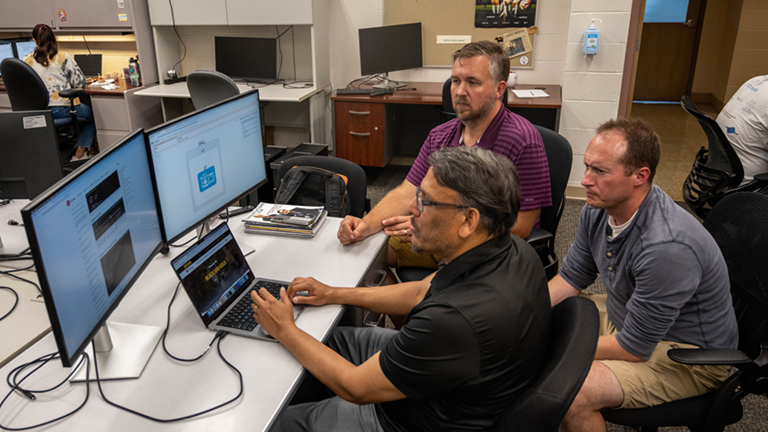July 31, 2025
Columbia teachers will learn to use a national research computing platform to teach kids about artificial intelligence.

In keeping with Mizzou’s mission to provide all Missourians with the benefits of a world-class research university, a Mizzou Engineering faculty member is partnering with local teachers to help middle-school students explore the power of high-end computing technology.
At the heart of the project is FABRIC, a cutting-edge national research infrastructure funded by the National Science Foundation (NSF). Praveen Rao, a researcher in the Department of Electrical Engineering and Computer Science, is leading the project.
“FABRIC allows researchers to process and analyze massive amounts of data faster, more efficiently, and more securely,” Rao said. “It’s like putting together an enormous and complicated jigsaw puzzle — with the right software and hardware tools, the process becomes more manageable and much quicker.”
Rao will introduce local educators to this powerful technology and develop hands-on, engaging curriculum for their classrooms; this effort is enabled by NSF’s Research Experiences for Teachers (RET) supplemental funding.
Teachers from Columbia Public Schools are learning to use FABRIC to help students understand concepts such as data science, AI, and distributed computing. As part of the collaboration, they are designing modules to introduce students to how advanced computing is used in the real world — for data analysis and training AI models.
John Johnson, who teaches gifted education at Jefferson Middle School, said the experience has been eye-opening.
“I had heard about these types of computer networks, but this is the first time I have personally been able to use them,” he said. “It’s been interesting to see how the resources get allocated and the security behind it.”
Johnson plans to teach students about FABRIC and how AI is programmed, how it learns and how it collects data.
“I hope they see the usefulness of computer processing in solving problems that are relevant to their current lives and their futures,” Johnson said.
Ryan Pingrey, who teaches math and game design, said the hands-on nature of the training made a big impact.
“Dr. Rao gives us initial instructions, some resources to explore, and then we get some tasks to test out what we learned,” Pingrey said. “We definitely run into some problems when we are on our own, but we get the chance to troubleshoot and figure things out.”
Pingrey also plans to help his students understand AI as a creative and collaborative tool.
“People are going to be using AI in almost every field,” Pingrey said. “I want students to explore how it works, make it better and find optimal uses for it.”
In addition to the middle school outreach, Rao’s project will also support new coursework for Mizzou computer science and informatics students and help lead a summer camp to introduce high schoolers to genomics and advanced computing.
“This is a hands-on opportunity for teachers to learn about advanced computing and bring leading-edge genomic research into their classrooms,” Rao said. “The future of research relies on cultivating young people’s interest in STEM fields today.”
Discover how Mizzou Engineering is shaping tomorrow’s tech leaders.